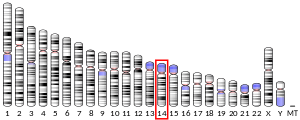YLPM1
YLP motif-containing protein 1 is a protein that in humans is encoded by the YLPM1 gene.[5][6]
References
- GRCh38: Ensembl release 89: ENSG00000119596 - Ensembl, May 2017
- GRCm38: Ensembl release 89: ENSMUSG00000021244 - Ensembl, May 2017
- "Human PubMed Reference:". National Center for Biotechnology Information, U.S. National Library of Medicine.
- "Mouse PubMed Reference:". National Center for Biotechnology Information, U.S. National Library of Medicine.
- Sherrington R, Rogaev EI, Liang Y, Rogaeva EA, Levesque G, Ikeda M, Chi H, Lin C, Li G, Holman K, et al. (Aug 1995). "Cloning of a gene bearing missense mutations in early-onset familial Alzheimer's disease". Nature. 375 (6534): 754–60. doi:10.1038/375754a0. PMID 7596406.
- "Entrez Gene: YLPM1 YLP motif containing 1".
Further reading
- Strausberg RL, Feingold EA, Grouse LH, et al. (2003). "Generation and initial analysis of more than 15,000 full-length human and mouse cDNA sequences". Proc. Natl. Acad. Sci. U.S.A. 99 (26): 16899–903. doi:10.1073/pnas.242603899. PMC 139241. PMID 12477932.
- Heilig R, Eckenberg R, Petit JL, et al. (2003). "The DNA sequence and analysis of human chromosome 14". Nature. 421 (6923): 601–7. doi:10.1038/nature01348. PMID 12508121.
- Ota T, Suzuki Y, Nishikawa T, et al. (2004). "Complete sequencing and characterization of 21,243 full-length human cDNAs". Nat. Genet. 36 (1): 40–5. doi:10.1038/ng1285. PMID 14702039.
- Beausoleil SA, Jedrychowski M, Schwartz D, et al. (2004). "Large-scale characterization of HeLa cell nuclear phosphoproteins". Proc. Natl. Acad. Sci. U.S.A. 101 (33): 12130–5. doi:10.1073/pnas.0404720101. PMC 514446. PMID 15302935.
- Gerhard DS, Wagner L, Feingold EA, et al. (2004). "The status, quality, and expansion of the NIH full-length cDNA project: the Mammalian Gene Collection (MGC)". Genome Res. 14 (10B): 2121–7. doi:10.1101/gr.2596504. PMC 528928. PMID 15489334.
- Armstrong L, Lako M, van Herpe I, et al. (2005). "A role for nucleoprotein Zap3 in the reduction of telomerase activity during embryonic stem cell differentiation". Mech. Dev. 121 (12): 1509–22. doi:10.1016/j.mod.2004.07.005. PMID 15511642.
- Kimura K, Wakamatsu A, Suzuki Y, et al. (2006). "Diversification of transcriptional modulation: large-scale identification and characterization of putative alternative promoters of human genes". Genome Res. 16 (1): 55–65. doi:10.1101/gr.4039406. PMC 1356129. PMID 16344560.
- Olsen JV, Blagoev B, Gnad F, et al. (2006). "Global, in vivo, and site-specific phosphorylation dynamics in signaling networks". Cell. 127 (3): 635–48. doi:10.1016/j.cell.2006.09.026. PMID 17081983.
- Ulke-Lemée A, Trinkle-Mulcahy L, Chaulk S, et al. (2007). "The nuclear PP1 interacting protein ZAP3 (ZAP) is a putative nucleoside kinase that complexes with SAM68, CIA, NF110/45, and HNRNP-G". Biochim. Biophys. Acta. 1774 (10): 1339–50. doi:10.1016/j.bbapap.2007.07.015. PMID 17890166.
This article is issued from Wikipedia. The text is licensed under Creative Commons - Attribution - Sharealike. Additional terms may apply for the media files.



